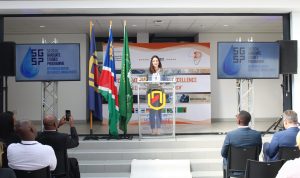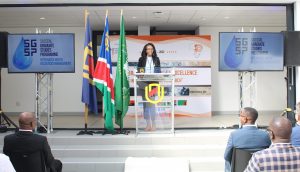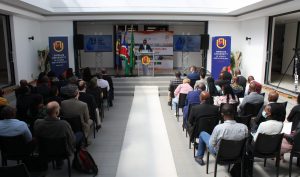SASSCAL Launches its Three-Year Graduate Studies Programme

SASSCAL BOARD members Ms Sofia Kasheeta and Dr Svenja Kruse, SASSCAL Executive Director Dr Jane Olwoch and ASAC members joined by NUST Chairperson of Council Ms Florette Nakusera , NUST Vice-Chancellor Dr Erold Naomab, Management staff, NUST Academic fraternity and the SGSP-IWRM study programme students
The Southern African Science Service Centre for Climate Change and Adaptive Land management (SASSCAL) recently launched its Graduate Studies Programme in Integrated Water Resource Management (SGSP-IWRM).
During the launch of the three-year programme, which will be undertaken at Namibia’s University of Science and Technology (NUST) from 2022 to 2024, 15 students from four of SASSCAL member states received their scholarships.
The programme aims to establish an innovative and excellent regional collaborative doctoral programme in IWRM; develop tailor-made short courses for decision-makers and industry; develop a new curriculum for a new regional PhD qualification in IWRM; and develop a blueprint document for the transformation of the SGSP-IWRM into a SASSCAL Centre/Institute of Excellence in IWRM at NUST.

Dr Svenja Kruse from German Federal Ministry of Education and Research (BMBF) and SASSCAL alternate Board Member delivering the keynote remarks
While handing over the scholarships to the students, Dr Svenja Kruse from the German Federal Ministry of Education and Research (BMBF) quoted saying that “the knowledge in integrated water resource management is one of the most essential fields of study, furthermore the first cohort will become experts in the future”.
The programme’s German partner, International Centre of Water Resources and Global Change (ICWRGC) at the Federal Institute of Hydrology in Koblenz strengthens the research programme development, teaching, student supervision and facilitates compulsory student mobility to Germany.
During the event, the Minister of Higher Education, Technology and Innovation (MHETI) in Namibia Dr Itah Kandji – Murangi said “I would like to express my gratitude to SASSCAL through the German Federal Ministry of Education and Research (BMBF) for injecting N$40 million into the SGSP-IWRM programme. I would also like to commend the longstanding relations between the Namibian and German Government, which continue to grow from strength to strength”
Recently, the BMBF Green hydrogen Innovation Commissioner, Dr Stefan Kaufmann, visited Namibia to advance the implementation of the Joint Communique of Intent signed between the two countries on cooperation in the field of energy and green hydrogen resources.
SASSCAL Board Chairperson, Ms Jane Chinkusu added in her speech by saying that “the establishment of the SGSP – IWRM will enable SASSCAL member states and SADC in general to achieve five Sustainable Development Goals (SDGs) namely SDG 6 – Clean Water and Sanitation, SDG 9 – Industry, Innovation and Infrastructure, SDG 11 – Sustainable Cities and Communities, SDG 12 – Responsible Consumption and Production and SDG 13 – Climate Action, while improving the water research and innovation profile of the Southern African Region”.
Ms Chinkusu further said that the SADC Water Development Framework and its supporting strategies, plans together with the IWRM concept offers solutions to deal with interlinked socio-economic, institutional, and ethical challenges by assessing and managing water resources through an interdisciplinary and multi-sectoral approach. “The importance of a holistic approach to sustainable water resources management and water security for sustainable socio-economic development in SADC, must not be underestimated” Ms Chinkusu emphasised.
The sentiments of the SASSCAL Board Chairperson were echoed by Namibian SASSCAL Board Member, Ms. Sofia Kasheeta who commented and said “the IWRM in Namibia has been identified as essential for managing its water sector. Due to the country’s dry climate and unpredictable rainfall, water resource challenges can only be addressed through a high degree of efficient water resources management”
“To address these issues, the Ministry of Agriculture, Water and Land Reform developed the Namibian IWRM Plan in August 2010 with an overall long-term goal of achieving a sustainable water resources management regime, which will ultimately lead to social equity, economic efficiency and environmental sustainability”, continued Ms. Kasheeta.
A water sector needs Assessment Analysis conducted by SASSCAL in 2016/17, identified and recognised the lack of trained human resources in water management and sciences in the SASSCAL member states and generally in the Southern Africa Development Community (SADC). In addition, the SADC Water Development Framework shows that there is a high and growing demand for experts to be trained on the concepts of IWRM.
“The experts need to be equipped with both technical and managerial knowledge”. In her closing remarks Ms Kasheeta expressed that Namibia was pleased to witness the opening of SGSP – IWRM at NUST through the partnership with BMBF.

SASSCAL Executive Director Dr Jane Olwoch delivering her remarks at the SGSP – IWRM Launch
Meanwhile, SASSCAL Executive Director, Dr Jane Olwoch said the study programme will use research, science, and technological innovation to transform the available water resources into clean and safe water to use, this is the challenge I put in the hands of the recipients of the SGSP – IWRM Scholarships.
“Africa and the SASSCAL region are preparing themselves to embrace the new emission free fuel – Green Hydrogen”. In this regard, Dr Olwoch added that water is again at the centre stage of this endeavour. “In our region, desalination of water is the best option for Green Hydrogen production. This partnership through the SGSP – IWRM provides another advantage to support other related programmes such as the Green Hydrogen in Namibia and in other SADC member states” says Dr Olwoch.
According to UN Water, Water Security is the capacity of a population to safeguard sustainable access to adequate quantities of acceptable quality water for sustaining livelihoods, human well-being, and socio-economic development, and ensuring protection against water-borne pollution and water-related disasters, and preserving ecosystems in a climate of peace and political stability. “My hope is that the SGSP would also contribute to this global action and the realization of several SDGs but in particular SDGs 6,” added the Executive Director.

NUST Vice-Chancellor Dr Erold Naomab delivering his remarks at the event
NUST’s High Tech Transfer Plaza Select (HTTPS) will house the three-year programme. NUST Vice Chancellor, Dr Erold Naomab said the financial support such as has been availed by SASSCAL, will go a long way in not only capacitating the water sector, but also in eliminating barriers to postgraduate study at NUST. “The partnership with SASSCAL is set to make a noteworthy contribution to capacitate professionals in the Water Sector as students wished to pursue their studies at Doctoral level,” said the Vice Chancellor.




